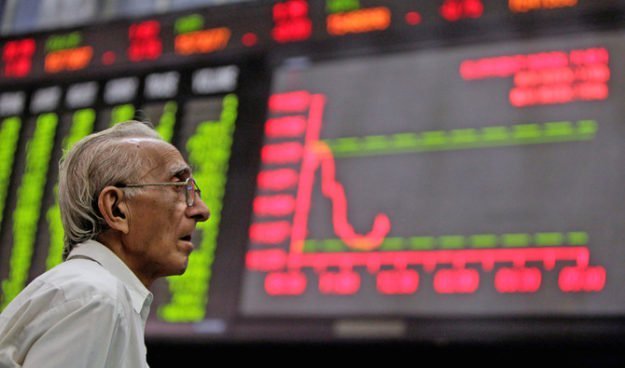
Earlier in the day, Iran launched missiles at US-led forces in Iraq in retaliation for the US drone strike that killed top Iranian commander Qassem Soleimani, which stoked fears of a new Middle East war. The move indicated the intensification of Middle East tensions, however, tweets by US President Donald Trump and Iran's foreign minister, later in the day, appeared to signal a period of calm.
Nevertheless, the missile strike by Iran caused a spike in oil prices in the international market but it gave up most of the gains later in the day. However, stocks of exploration and production companies at the local bourse faced panic selling and the sector closed in the red.
Earlier, trading began with a sharp dip, however, the index managed to recover and trade in the positive zone for a brief period.
Later, following the trend in global markets, the KSE-100 index came under selling pressure and remained in the negative territory for the rest of the day. A buying spree towards the end of the session helped erase some of the losses.
At close, the benchmark KSE 100-share Index recorded a decrease of 546.90 points, or 1.31%, to settle at 41,357.57.
In its report, Arif Habib Limited stated that the market once again reacted to the geopolitical tensions following an Iranian missile strike early in the morning on Iraqi military bases housing American soldiers.
"The global oil market went haywire with an initial surge towards $72 per barrel, but it gradually came down as the Iranian government signalled an end to the confrontation for the time being," it said. "The oil and gas chain bore the brunt of the war hysteria as stock prices went down in early trading."
Later, as nerves calmed down, the market staged a recovery, erasing a loss of around 400 points and went positive by 35 points. Selling pressure again mounted later in the day and the market saw losses pile up to 731 points.
Before close, the market made another attempt to recover the loss and ended the session with a loss of around 550 points.
The banking sector led the volumes with trading in 54.9 million shares, followed by power companies (44.8 million) and cement producers (26.9 million).
Among individual stocks, K-Electric recorded trading in 39.4 million shares, followed by The Bank of Punjab (38.2 million) and TRG Pakistan (11.6 million), the report added.
Topline Securities, in its report, stated that the KSE-100 index remained under pressure, declining by 547 points or 1.31% to close at 41,358.
"A missile attack from Iran at US base camps in Iraq increased tensions between the two countries, which weighed negatively on investors' mind," it said.
Among individual companies, HBL contributed the most to the decline in the KSE-100 index with 104 points, followed by Pakistan Petroleum (49 points), Hubco (42 points), Fauji Fertiliser (37 points) and NBP (19 points).
Investor participation in terms of volume was up 35% day-on-day at 280 million shares, led by K-Electric (39 million). Traded value was up 27% day-on-day at Rs11.69 billion, the report added.
Overall, trading volumes rose to 280.1 million shares compared with Tuesday's tally of 206.9 million. The value of shares traded during the day was Rs11.7 billion.
Shares of 353 companies were traded. At the end of the day, 42 stocks closed higher, 292 declined and 19 remained unchanged.
K-Electric was the volume leader with 39.5 million shares, losing Rs0.15 to close at Rs4.43. It was followed by The Bank of Punjab with 38.2 million shares, gaining Rs0.07 to close at Rs11.81 and TRG Pakistan with 11.6 million shares, losing Re1 to close at Rs26.59.
Foreign institutional investors were net sellers of Rs106 million worth of shares during the trading session, according to data compiled by the National Clearing Company of Pakistan.



1732503274-0/Untitled-design-(43)1732503274-0-165x106.webp)
1732501636-0/Untitled-design-(42)1732501636-0-165x106.webp)
1732486769-0/image-(8)1732486769-0-270x192.webp)











COMMENTS
Comments are moderated and generally will be posted if they are on-topic and not abusive.
For more information, please see our Comments FAQ